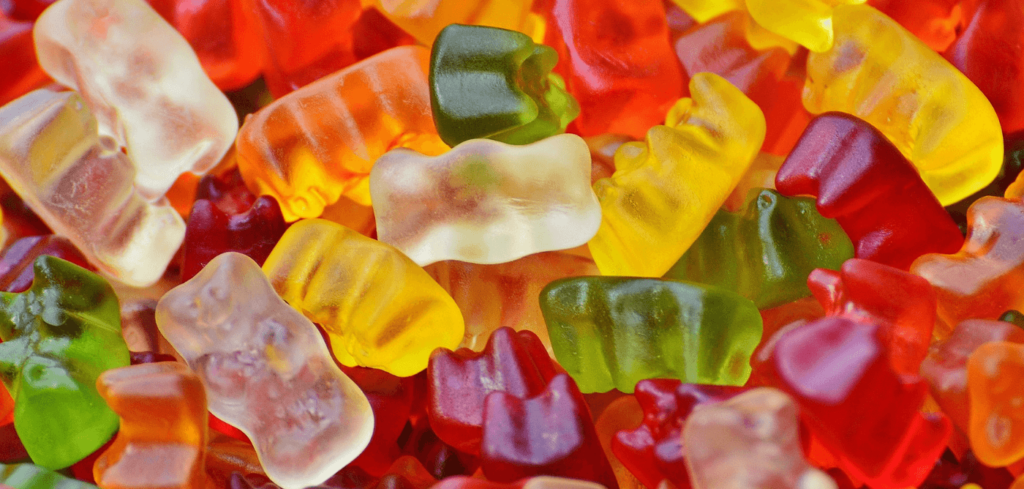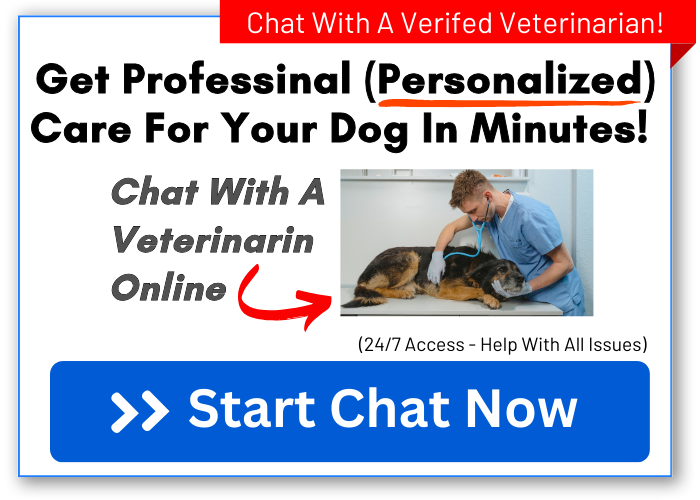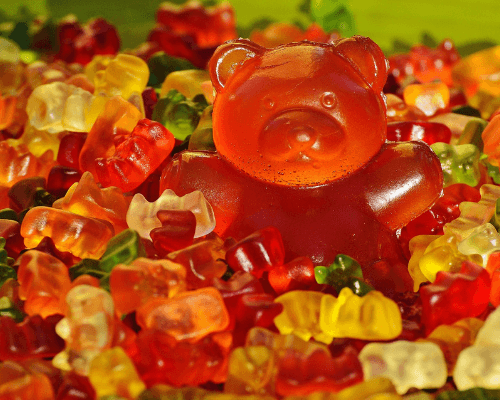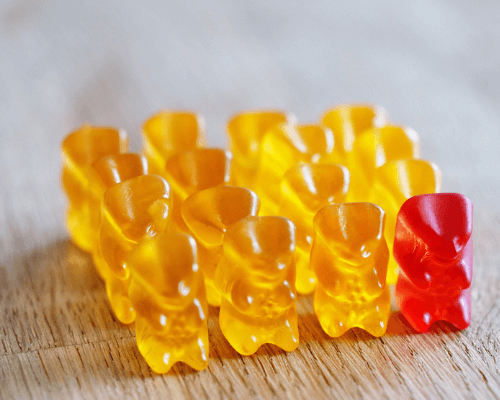
We all love our dogs and we love sharing our snacks with them…
However, there are certain foods that your fur baby should never be allowed to eat…
One of these snacks would be gummy bears, and if your dog ate gummy bears, there are several things you should know…

So in this article, we’ll be covering the following information…
- My Dog Ate Gummy Bears – Are They Toxic?
- What To Do If Your Dog Ate Gummy Bears…
- How To Prevent Your Dog From Eating Gummy Bears In The Future…
In the end, you’ll know why dogs should never be allowed to eat gummy bears, and you’ll know what to do if your dog is able to get his little paws on them…
My Dog Ate Gummy Bears – Are They Toxic?
If your dog ate gummy bears you should first check the ingredients. If the gummy bears contain xylitol, as many sugar-free gummy bears do, you should contact a veterinarian immediately because your dog is at risk of xylitol poisoning.
That being said, even gummy bears that contain regular sugar and no xylitol can cause problems for dogs.
Gummy Bears With Sugar…
Sugar seems to be everyone’s enemy, and that includes both us humans and our dogs. While artificial sugar is bad, it’s not toxic unless consumed in extremely large amounts.

Nonetheless, you should avoid giving your pup anything with sugar in it. The main problem is a dog’s digestive tract isn’t built to break down artificial sugars.
So, if they consume sweets or candies like gummy bears, they’ll be likely to suffer from gastroenteritis. This usually results in things like vomiting, gas, or diarrhea.
Also, our four-legged friends shouldn’t have sugar for basically all the same reasons we shouldn’t consume too much of it ourselves, such as:
- It can be difficult for your dog’s digestive system to absorb, causing aches, pain, and discomfort.
- It can cause increased weight gain and obesity.
- It may lead to diabetes.
- It can result in dental health issues.
Sugar-Free Gummy Bears…
Many types of sugar-free gummy bears contain something called xylitol, and even though it sounds uncommon, you’d be surprised at how much of it we use every day.
For example, if you use toothpaste or mouthwash, you’ve probably consumed xylitol. In addition to that, if you’ve ever chewed sugar-free gum, it probably contained xylitol as well.
When consumed in reasonable amounts, this natural sweetener is safe for us humans, but the same can’t be said for our dogs. In fact, xylitol is extremely toxic to dogs.
To put things into perspective, one piece of sugar-free gum contains about one gram of xylitol.
That means two of those pieces can induce hypoglycemia in a medium-sized 40-pound dog, and ten pieces of gum can cause liver failure.
The point is that even if your dog ate a very small amount of sugar-free gummy bears containing xylitol, he or she could be in danger and you should contact a vet immediately…

Symptoms Of Xylitol Poisoning…
Xylitol poisoning in dogs is an extremely serious medical issue. Unfortunately, if not dealt with right away, it has the potential to kill your pup.
Here are some of the symptoms that will indicate your dog has xylitol poisoning:
- Vomiting
- Weakness and lethargy
- A sudden drop in your dog’s blood sugar level
- Gastrointestinal discomfort
- Difficult walking and standing up
- Lack of coordination
- Seizures
- Tremors
- Coma
What To Do If Your Dog Ate Gummy Bears…
The first thing to do if your dog ate gummy bears is to check to see if they actually contain any xylitol or not.
Some gummy bears use sugar and are completely xylitol-free, which means they’re less of a health risk.

However, many sugar-free gummy bears will include xylitol, and the only way to be sure is to check the ingredients on the packaging.
If the gummy bears contain xylitol, you have to come up with a plan of action fast, and you should start by trying to figure out how much your dog ate.
One Or Two Gummy Bears…
As I mentioned earlier, any amount of this natural sweetener is bad for your pooch. Although, the average lethal amount agreed on by medical experts is 50 mg of xylitol for each pound of your dog’s body weight.
Chances are if your four-legged friend gobbled up a couple of gummy bears, you have little to worry about.
Most of the time, your dog will have an upset stomach and nothing worse will happen. That being said, you should still contact a veterinarian as soon as possible…

Tell the vet the number of gummy bears your dog ate, and have the packaging ready so that you can inform him or her of all the ingredients because there may be others that are problematic aside from xylitol.

The vet may recommend that you take your dog into the animal clinic to get checked out. It’s also possible that he or she will recommend that your dog goes on a bland diet for a couple of days.
If that’s the case, a bland diet should include soft, easy-to-digest foods, such as:
- Boiled skinless, boneless chicken
- Turkey meat
- White rice
- Cottage cheese
- Sweet potatoes
- Pumpkin
A Whole Bag Of Gummy Bears…
If your dog ate a bag full of sugar-free gummy bears, you should be on the lookout for signs of xylitol poisoning. Symptoms usually start developing within 20 minutes of eating.
If you notice any of the symptoms I mentioned above, contact a vet immediately…

Another option is the Animal Poison Control Center. They have a 24/7 hotline run and operated by qualified vets at the American Society for the Prevention of Cruelty to Animals (ASPCA).
In the meantime, if your dog ate more than just a handful of gummies, try to get your pooch to drink as much water as they can.
The more they drink, the better their chances are of flushing the toxins out of their system. Water can also help your dog keep calm, reduce dehydration, and adjust his blood sugar levels.
The vet may advise that you induce vomiting, providing that your pooch isn’t hypoglycemic.
Generally, this can be done with a hydrogen peroxide solution, but the vet will give you guidance in terms of how much is appropriate for your particular dog.
How To Prevent Your Dog From Eating Gummy Bears In The Future…
The first thing you should do is obvious, and that is to store your gummy bears in a place where your dog can never access them.
For example, keeping them in a sealed container, in a cabinet, or high up in the pantry are all good locations for storing gummy bears and other snacks that your dog should never eat.

Aside from that, you should also teach your dog to follow commands such as “drop it!” or “leave it!” because aside from making your dog more obedient, these commands can go a long way at helping keep him or her safe.
If you need help training your dog, there are several great training programs out there, but the one I recommend is called Brain Training For Dogs.
I like it because it’s easy to follow, it works quickly, and you can access the program from the comfort of your own home.
Part of the reason it works so quickly is because it teaches you to easily redirect your dog’s natural intelligence into following your directions.
If you’d like to learn more about how Brain Training For Dogs can help you prevent your dog from eating toxic things in the future, click the link below…
>> Click Here To Learn How Brain Training For Dogs Can Help You!
The Takeaway…
So in summary, if your dog ate gummy bears, the most important thing you need to determine is whether or not they were xylitol-free.
If they were, you should be able to monitor your dog for any unusual behavior or symptoms and contact the vet if you need to.
However, if the gummy bears did contain xylitol, you should contact a vet immediately regardless of the amount your dog ate.
In both scenarios, you will have to monitor your dog for several days after the incident.
But hopefully, after a few days, your doggie will recover and be back to his healthy, curious, and fun-loving old self!